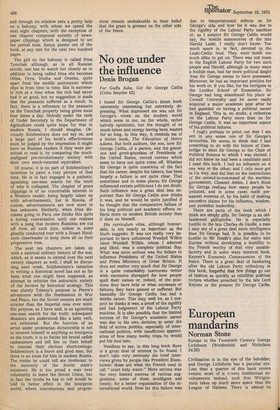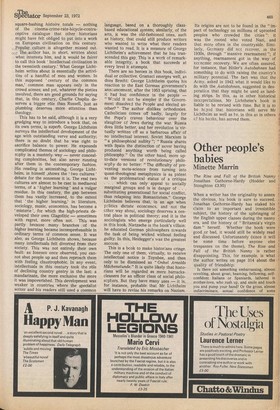European mandarins
Norman Stone
Europe in the Twentieth Century George Lichtheim (Weidenfeld and Nicholson £4.50) Civilisation is in the eye of the beholder; and George Lichtheim has a peculiar eye. Less than a quarter of this book covers events; most of it ewers intellectual developments instead, such that Wittgenstein takes up much more space than the League of Nations. There is almost no square-bashing histoire totale — nothing of the cinema-crime-rate-bicycle-contraceptive catalogue that other historians might have felt obliged to put into a work on European civilisation on this century. Ropular culture is altogether missed out.
t) The, author has, in short, written about what interests him, and it would be fairer to call this book 'Intellectual civilisation in the twentieth century.' What George Lichtheim writes about is essentially the activities of a handful of men and women. In this supposed 'century of the common man,' common man appears only in the crowd scenes; and yet, whatever the pieties involved, there are good grounds for saying that, in this century, Charlie Chaplin deserves a bigger rOle than Russell, just as plumbing deserves more attention than theology.
This has to be said, although it is a very grudging way to introduce a book that, on its own terms, is superb. George Lichtheim surveys the intellectual development of the age with outstanding verve and authority; there is no doubt that he was right to sacrifice balance to power. He expounds complicated themes of sociology and philosophy in a masterly way — never concealing complexities, but also never running after them in the contemporary fashion. His reading is astonishing. George Lichtheim, in himself ,shows the 'two cultures' debate for the nonsense it is. The real two cultures are almost to be cast in mediaeval terms, of a 'higher learning' and a vulgar residue. In this century, the gap between them has vastly increased, to the extent that 'the higher learning,' in literature, sociology, music, economics, has become a ' misterie ', for which the high-priests developed their own Glagolitic — sometimes with regret, more often not. This was partly because many branches of the higher learning became incomprehensible in ordinary terms of common sense. It was also, as George Lichtheim shows, because many intellectuals felt divorced from their society. This was not entirely their own fault: as Ionesco once observed, you cannot shut people up and then reproach them with feeling claustrophobic. In any event, intellectuals in this century took the rOle of declining country gentry in the last: a mandarinate, the more exclusive the more it was impoverished. This development was weaker in countries where the specialist writer and his readers still used a common language, based on a thoroughly classbased educational system; similarly, of the arts, it was the old-fashioned ones, such as history, that could still produce writers who wanted to write what their readers wanted to read. It is a measure of George Lichtheim's achievement that he has transcended this gap. This is a work of remarkable integrity, a book that succeeds at every level it attempts.
There are no heroes in this book, individual or collective. Gramsci emerges well, as does Brecht: George Lichtheim quotes his reaction to the East German government's anmuncement, after the 1953 uprising, that it had lost confidence in the people — " Warld it not be simpler if the Government dissolved the People and elected another?" The author dislikes orthodoxies. Catholicism comes off badly, largely for the Pope's craven behaviour over the slaughter of Jews during the war. Russia does little better, and her revolution is virtually written cff as a barbarous affair of no intellectual interest. Soviet Marxism is " a philosophical nullity "; " Russia shares with Spain the distinction of never having produced anything worth being called philosophy." On the other hand, more upto-date versions of revolutionary philoscphy do nc better: "The difficulty of preventing meta-science from turning into quasi-theological metaphysics is as patent as the problematical status of a critique . . . which can only appeal to socially marginal groups and is in danger of . . . substituting generational for social conflict, thus relapsing into Romanticism." George Lichtheim believes that, in an age when pclitics dictate economics, and not the ether way about, sociology deserves a central place in political theory; and it is the sociologists who emerge particularly well in this book. Nietzsche is the book's villain: he educated German philosophers towards the task of being wicked without feeling guilty. In this, Heidegger's was the greatest
SUCCESS.
This is a bcok to make historians cringe. The only one of them, virtually, to receive intellectual notice is Toynbee, and then only to be dismissed as " Onkel Arnolds Mtichenstunde." It is quite likely that historians will be regarded as mere barrackscleaners for an officer class of social philosophers. But they have many uses -it is, for instance, probable that Mr Lichtheim will have to revise his remarks on Nazism.
Its origins are not to be found in the "impact of technology on millions of uprooted peoples who crowded the cities ": it was the rooted who voted Nazi, and that more often in the countryside. Similarly, Germany did net recover, in the 1930s, through "massive rearmament "; if anything, rearmament got in the way of eccncmic recovery. We are often assured, for instance, that Hitler's Autobahnen had something to do with raising the country's military potential. The fact was that the Army, asked in 1942 what it would like to do with the Autobahnen, suggested in desperaticn that they might be used as landing strips. In this, as in other historical interpretations, Mr Lichtheim's book is liable tc be revised with time. But it is to be hcp3d that historians will serve Mr Lichtheim as well as he, in this as in others cf his books, has served them.



































 Previous page
Previous page